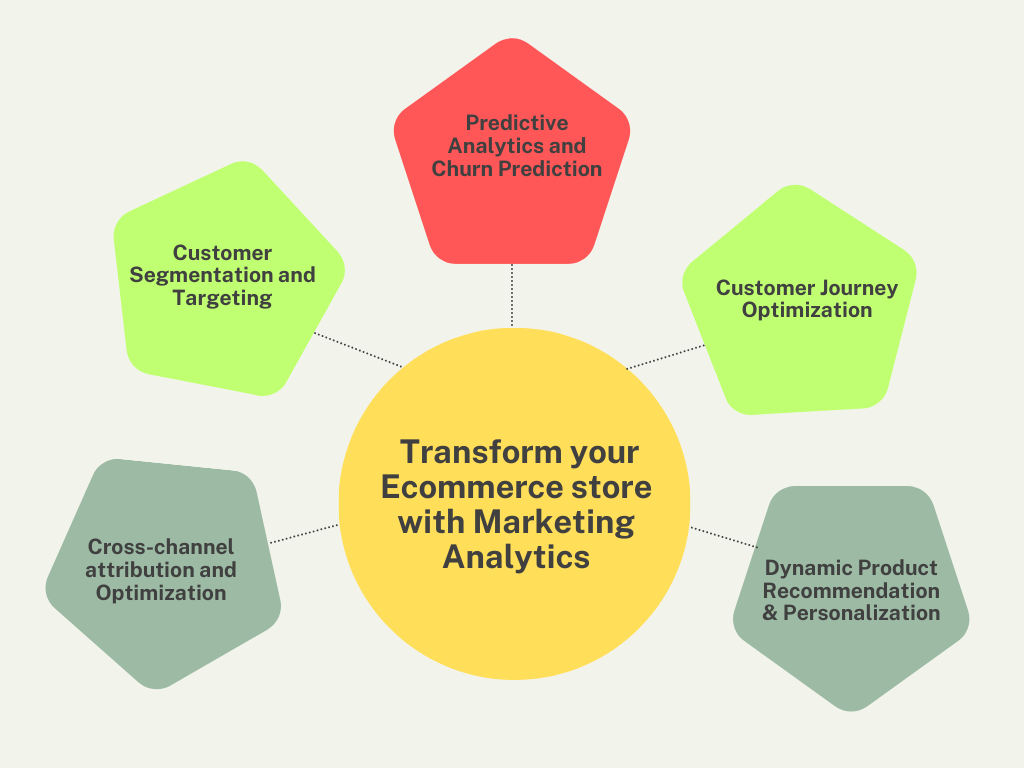
Are you tired of creating marketing campaigns for your Ecommerce store that yield little to no results? Do you want to enhance the shopping experience and maximize user traffic on your Ecommerce store? If so, you should learn more about how Marketing Analytics can help you transform your Ecommerce store.
The e-commerce industry has come a long way. With new competitors and trends arising in the market every day, it has become tremendously overwhelming for Ecommerce stores. So, it calls for the need to have data-driven insights.
Your brand might have a curated storefront, a vast collection of products, and marketing campaigns that are sure to go viral. However, without the power of Marketing Analytics, these characteristics will not yield significant results. Think of it as the hidden formula for unlocking the true potential of your E-commerce store.
Get ready to learn how Marketing Analytics can transform your Ecommerce store! Cymetrix, a top Data Analytics Company in India and the USA, is here to share its expertise. Their Data Analytics Consulting team will summarize their experience so you can easily understand the benefits of Marketing Analytics for your Ecommerce store.
What is Marketing Analytics, and how does it work?
In this digital era, where every click leads a trail, using marketing data is no longer a luxury but a necessity for surviving in a competitive market. And that’s precisely where Marketing Analytics steps in.
But what is Marketing Analytics, you must be wondering?
To explain in simpler terms, it refers to using data science and statistical techniques in marketing activities. It involves gathering, analyzing, and interpreting marketing data to understand customer behavior, campaign performance, and overall Marketing ROI.
Through a systematic blend of technology and analytical techniques, Marketing Analytics can help you answer the questions that keep every marketer up at night:
- What channels are driving leads and conversions?
- Is our content resonating with the target audience?
- Are we allocating the budget effectively across campaigns?
- How can we personalize the customer experience for maximum impact?
By harnessing the power of Marketing Analytics, an Ecommerce store like yours can unlock the secrets of marketing success and thrive in the ever-evolving digital landscape.
If you want to know more about the role of Data in marketing, don’t forget to read What is Data Driven Marketing.

Marketing Analytics: Transform your e-commerce store
Now that you understand what Marketing Analytics is, it’s time to dive deep and see how it can impact your Ecommerce store. Here’s how you can put it into action:
Customer Segmentation and Targeting
Do you know? According to a recent survey, segmentation can help you increase your conversion rate by up to 50%. Thus highlighting the significance of customer segmentation and targeting. Here’s how you can get started:
- Primarily, you need to use a CDP (Customer Data Platform) like Salesforce Data Cloud, Segment, or Customer.io to unify data from various sources (web, CRM, app) and create detailed customer segments.
- Then, you can use tools like GA4 (Google Analytics 4) or Adobe Analytics to analyze behavior and purchase patterns. Once done, we recommend employing machine learning models like K-means clustering to segment customers based on demographics, interests, and purchase history.
- Lastly, we suggest integrating your CDP with a data warehouse using tools like Stitch or Fivertran. Then, you would need dashboards and reports to visualize customer segments, behavior patterns, and lifetime value.
After you have followed these steps, you will have the necessary customer data to segment and individually target your customers.
(Bonus tip: You can also consider employing Cohort analysis to track specific customer groups over time and identify market trends)
Cross-channel attribution and Optimization
As an Ecommerce marketer, it’s crucial to comprehend the impact of every channel or touchpoint on your sales. Knowing how each source contributes to your overall revenue can help you make informed decisions and maximize your profits. However, how do you do so?
First, you should implement Multi-Channel attribution models (MTA) like Google’s Data-Driven Attribution or Matomo’s attribution manager. These models analyze touchpoints across channels (social, web, email, paid ads) and assign conversion credits based on each influence.
Then, you can set up conversion tracking across all channels and link them with your MTA. Afterward, you are required to analyze attribution reports to identify underperforming channels and optimize campaigns for maximum ROI.
At last, you can use GA4’s looker studio or third-party dashboards to visualize attribution data. It helps you visualize how different channels contribute to sales and make data-driven decisions.
Dynamic Product Recommendation and Personalization
Have you ever noticed the product recommendation section on Ecommerce websites like Amazon? Well, that’s the kind of recommendation and personalization you need nowadays.
For this purpose, you can implement AI-powered recommendation engines like Kibo Commerce or Dynamic Yield. These engines analyze customer behavior, purchase history, and real-time product data to recommend relevant products on pages, carts, and emails.
Then, you can leverage personalization tools like Monetate or Optimizely to personalize website content, banners, and pop-ups based on individual customer preferences.
Finally, we suggest integrating the recommendation engine with your Ecommerce platform and product data. Once done, you can train it on historical data and customer interactions.
(Bonus tip: You can use A/B testing and personalization rules to optimize recommendation placement and personalize website elements for different segments)
Customer Journey Optimization
Are you aware that 86% of buyers are willing to pay more for a great customer experience?
Particularly in Ecommerce stores, the customer journey and shopping experience are critical to drive sales. Without a seamless and enjoyable shopping experience, you risk losing customers and missing out on potential sales.
However, how can Marketing Analytics help you here?
So, first, you should use tools like Hotjar or Crazy Egg to record your website sessions and track user behavior. Then, analyze recordings and heatmaps to identify user pain points and friction in the purchase journey.
To complete the process, you can set up A/B testing tools like Optimizely or Google Optimize and design hypotheses to test different website variations and identify the most effective elements for conversions. After that, you can continue to track conversion rates and optimize your website based on the results.
Predictive Analytics and Churn Prediction
In today’s ever-changing market, losing customers to new competitors and trends has become common. But what if there was a way to stay ahead of the game and predict customer churn before it happens?
For instance, you can start your customer retention strategy by employing AI and machine learning models. That will help you accurately predict customer churn and proactively identify at-risk customers. You can use tools like ChurnIQ or Profitwell, which uses historical data and customer behavior to predict churn likelihood.
After that, you should integrate your machine learning models with your CRM and Marketing Automation tools (For example, Hubspot or Pardot). Then, you can build targeted email campaigns, promotions, and personalized offers to re-engage at-risk customers based on churn risk scores.
By accurately forecasting customer churn and identifying at-risk customers in real time, businesses can proactively take action to prevent customer attrition and enhance customer loyalty.
Wrapping Up
So, there you have it- the lowdown on how Marketing Analytics can work wonders for your Ecommerce store!
By harnessing the power of data, you can better understand your customers, refine your marketing strategies, and ultimately deliver exceptional shopping experiences.
And hey- if you’re overwhelmed with the complexities of implementing Marketing Analytics- feel free to contact Cymetrix. Don’t wait: schedule the consultation now!
